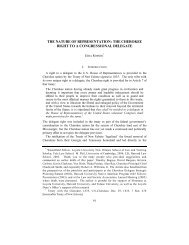Climbing Above the Culture Clash
Climbing Above the Culture Clash
Climbing Above the Culture Clash
Create successful ePaper yourself
Turn your PDF publications into a flip-book with our unique Google optimized e-Paper software.
Q&A with Professors Linda McClain<br />
and Katharine Silbaugh<br />
Professors Offer Course on Gender, Law & Public Policy This Fall<br />
Over <strong>the</strong> past few decades, <strong>the</strong><br />
conversation about gender and <strong>the</strong><br />
law has expanded beyond feminist<br />
legal <strong>the</strong>ory to include a much broader<br />
discussion of social and political equality<br />
across a wide spectrum of situations.<br />
Ending gender discrimination and<br />
securing women’s rights has become a<br />
priority for some policymakers, including<br />
President Obama, who appointed a new<br />
White House Council on Women and<br />
Girls. An August 17, 2009, article in<br />
The New York Times Magazine titled<br />
“The Women’s Crusade” asserted that<br />
<strong>the</strong> oppression of women and girls<br />
worldwide has become <strong>the</strong> human rights<br />
cause of our time. Family definition,<br />
same-sex marriage, lesbian, gay, bisexual<br />
and transgender (LGBT) rights, black<br />
masculinity issues, reproductive rights,<br />
freedom from domestic violence, and<br />
work-life balance are just a few of <strong>the</strong><br />
topics encompassed within <strong>the</strong> broad<br />
category of gender today. This past<br />
spring, Professors Linda McClain and<br />
Katharine Silbaugh pioneered <strong>the</strong> new<br />
BU Law colloquium “Research on<br />
Gender, Law & Public Policy.” The<br />
course allowed second- and third-year<br />
students at BU Law — along with BU<br />
professors and political science graduate<br />
students — <strong>the</strong> opportunity to meet<br />
with experts in <strong>the</strong> field to discuss <strong>the</strong>ir<br />
works in progress. Using gender as a lens<br />
through which to view many different<br />
topics in law and policy, Silbaugh and<br />
McClain capitalized on <strong>the</strong> wealth of<br />
experts at BU and in <strong>the</strong> region.<br />
In structuring <strong>the</strong> course, McClain<br />
and Silbaugh chose to expose students<br />
to a range of different methodologies<br />
and perspectives, enlisting experts in<br />
law, history, political science, social<br />
policy and literature who are exploring<br />
issues of gender, law and public policy.<br />
Students were asked to examine<br />
scholarly work, think critically about<br />
it and become familiar with some<br />
of <strong>the</strong> varied approaches scholars<br />
may take when examining a topic.<br />
McClain and Silbaugh answer<br />
questions about <strong>the</strong> Gender, Law<br />
& Public Policy course, which<br />
McClain will teach this fall.<br />
Pnina Lahav. And <strong>the</strong>re was student interest<br />
in bringing in high-level scholars who have<br />
developed expertise across different areas that<br />
touch on gender.<br />
Linda McClain: I think that a lot of pressing<br />
issues of law and policy involve gender in<br />
some way. By that, I don’t mean simply<br />
questions of women’s basic equality, but also<br />
issues about things like family definition,<br />
<strong>the</strong> rights of gay men and lesbians and of<br />
transgendered persons, just to name a few.<br />
Q: What did you hope to accomplish<br />
with this course<br />
LM: [We hoped to give] students a chance<br />
to see how very significant law and policy<br />
issues involve gender questions, and also to<br />
give <strong>the</strong>m <strong>the</strong> chance to meet and interact<br />
with leading scholars who make gender a<br />
focus of <strong>the</strong>ir scholarly work — not just law<br />
professors, but also people in some o<strong>the</strong>r<br />
disciplines as well.<br />
Q: What was your primary<br />
motivation for developing an upperlevel<br />
course on law and gender<br />
Kate Silbaugh: We wanted to capitalize<br />
on expertise that Linda and I share, as well<br />
as [BU Law professors] Kristin Collins and<br />
Fall 2009 | The Record | 25









